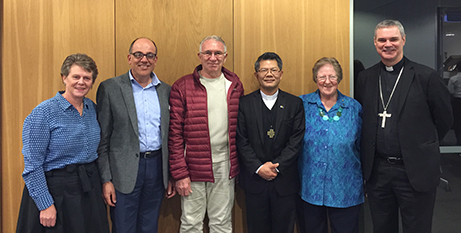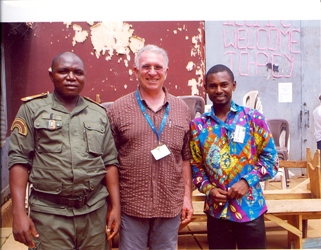AN INSIGHT INTO THE WORK OF PRISON MINISTRY: PETER CARROLL MSC.
The work of Catholic prison chaplains was celebrated at a conference in Melbourne last week.

From left: Alison Burt (Executive Secretary, Bishops Commission for Social Justice), Paul Zammit (Master of Ceremonies), Fr Peter Carroll MSC (Chair, Australian Catholic Prisoners Pastoral Care Council), Bishop Vincent Long (Chair, Bishops Commission for Social Justice), Sr Mary O’Shannassy SGS (Member of the Australian Catholic Prisoners Pastoral Care Council and Director, Catholic Prison Ministry Victoria, CatholicCare Melbourne), Melbourne Archbishop Peter A. Comensoli.
Catholic prison chaplains have heard how their mission is becoming increasingly vital as Australia’s corrections system expands, conservatively costing the country $16 billion annually.
The two-day gathering in Melbourne, supported by the Australian Catholic Bishops Conference and the Australian Catholic Prisoners Pastoral Care Council, focused on the theme “I have come that you may have life and have it to the full” (John 10:10).
Catholic chaplains currently visit prisoners, those on remand and refugees in detention centres to provide a range of pastoral care services and support for individuals and families. The national gathering last week sought to provide chaplains with time for formation, professional development, spiritual nourishment and fellowship with peers.

Some years ago, Peter Carroll at an international prison chaplains' conference in Cameroun
When Catholic Church Insurance donated goods and funds to support the inaugural Catholic Prison Ministers Gathering, they spoke to Fr. Peter Carroll MSC, who helped organise the event, to learn more about the work of the Catholic Prison Chaplaincy and why it needs the support of the Catholic community.
The role of prison chaplains
Fr. Peter is the Catholic chaplain at Sydney's Long Bay Prison and provides sacramental support to the Catholic chaplains at the Silverwater Correctional Complexes. He says prison chaplains support inmates in various ways: "Firstly, the prison chaplain provides the opportunity for people to express their faith, to take time to pray, to support people who want to pray. A lot of people have an experience of loss – perhaps in their family – while in prison, (and even though they may not usually go to church), we [the chaplains] are an avenue for people to express their grief. We also run programs of loss and grief for people in prison."
He adds: "Even just being people that the inmates know are not judgmental. We are the one avenue they can go to if things are not going well for them, or they need support, or if their family needs some extra support. We can be a listening ear for both the inmate and their family."
Putting judgments aside
Fr. Peter notes that non-judgment is an essential quality for those working as prison chaplains.
"They [inmates] have already been judged by the courts, and by society; so they feel like they don't belong. And so they come to prison and – because they have already been told by society they belong in prison – they have a sense they don't belong anywhere else," he says.
"So an important aspect of prison ministry is to preach to them that, 'We know you are here and the church cares for you'. Sometimes they are not convinced of that and sometimes it is difficult to convince them the church cares for them. But we try to tell them God cares. They say: I don't have any experience of belonging. Because sometimes they have been cut off from their family. They have been cut off from their friends. So to even have that experience in prison... we tell them God cares."
Helping build bridges
This year's Catholic Prison Ministers Gathering is the first to date. High on its agenda is the development and creation of a three-year plan of action; one that will work towards Pope Francis's Jubilee Year of Mercy, which begins on 8 December of this year.
Fr. Peter says this includes looking at how to engage the Catholic community in the process of people coming out of prison.
"People often call it reintegration, but it's not reintegration because we don't always want people who have come out of prison to go back to where they started. It's about building a bridge into the community – positive places where they can find a home. A community. Sometimes, even if they have had a home, families don't want them back. So people find themselves having to build new relationships. I've had guys who have got out of prison say they have gone back to where they began, where they put their life on pause, and then realised that if they kept going back to this - these people and that relationship – that they are going to end up in prison again. So they want to stop and ask: What relationships do I have to go back to?

Fr. Peter says: "The plan of action is to see: Can we engage with the Catholic community? And how do we engage with the Catholic community to be a bridge prisoners can walk to?"
